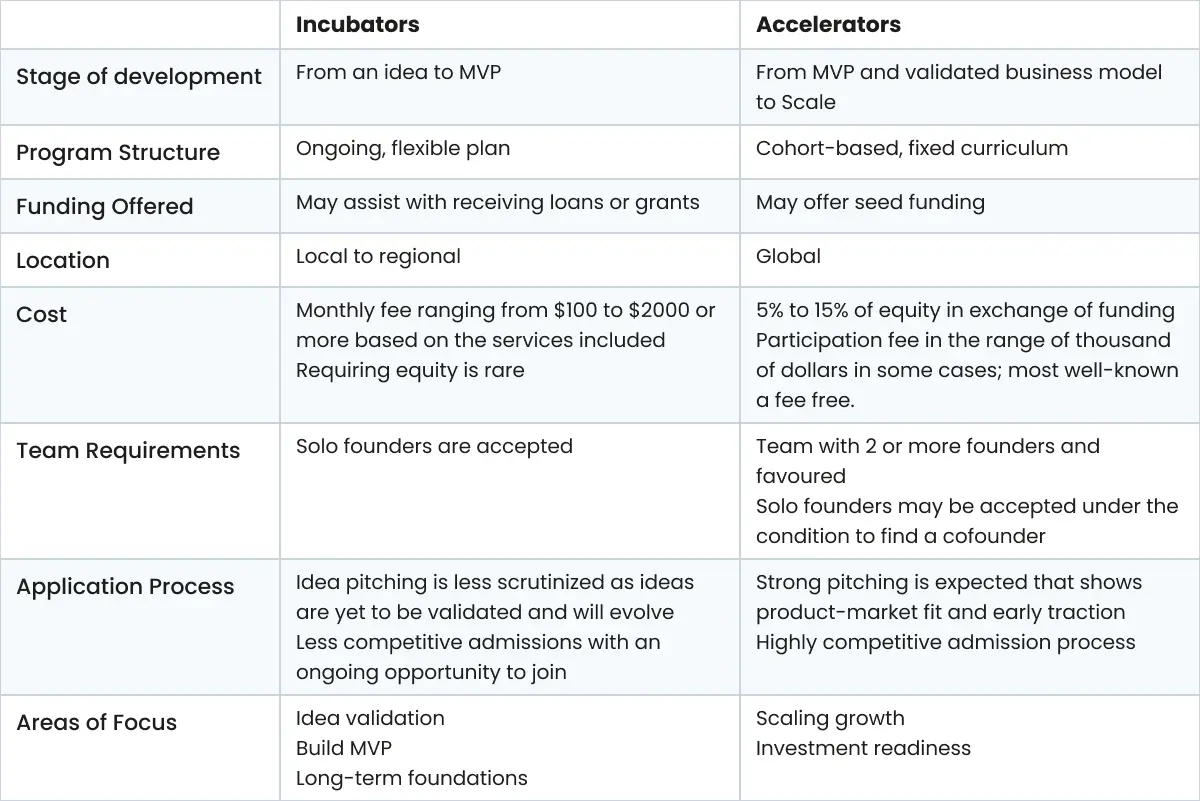What is a Startup Accelerator, and how does it work?
Oct 4, 2024 • 8 min read
What is a Startup Accelerator?
Startup Accelerator is a program designed specifically to accelerate growth for products that have achieved product-market fit. It provides the necessary conditions for early-stage startup to achieve exponential growth.
Benefits
Mentorship and guidance
Serial entrepreneurs and industry veterans are often among the people who support tech startup founders on their journey. This is one of the most impactful benefits of being part of an accelerator. YCombinator participants, for example, can benefit from the guidance of Paul Graham and Sam Altman.
Networking
Accelerators open the door to a vast network of contacts that can be handy for a growing team in many ways: finding customers, team members, key partners, etc. This aspect is especially powerful in vertically specialized accelerators that focus on a specific industry. Through the years of work, such programs establish connections with the key people you will need to get to the next step.
Funding
Most startups provide funding as part of their program. Access to capital is an important element of scaling, and it’s a natural part of an accelerator's offering.
Characteristics
Let's go through the main characteristics of a startup accelerator that sets them apart from other types of program the supports entrepreneurship.
Cohort-Based
Most accelerators accept startups in batches, and teams in the same batch start and finish at the same time. This aspect of the accelerator programs adds an additional element of peer support and collaboration that can be especially valuable.
Fixed Duration
Accelerator batches are fixed in duration, usually 3-6 months, which makes them very intense. Participants are required to commit fully to the program for its duration.
The structured curriculum and intense mentorship are combined with a lot of hands-on work, which can easily consume the whole team's available time. To get the maximum out of the program, you won’t be able to effectively combine that with other personal or professional commitments.
On-Site Presence
Most traditional accelerators still require teams to reallocate for the duration of the program. As part of the accelerator offer, participants get access to office space (in a coworking space or a dedicated office) where they can fully immerse themselves in their business's growth surrounded by mentors, peers, and partners.
How do startup accelerators work?
1. Application and Admission
Accelerators have limited seats in their programs, and for the good programs, there is a lot of demand. Such high demand means that only the most prepared applicants will be approved.
- The process usually starts with an online application that captures basic details about the startup, such as team composition, product description, target market, traction metrics, and so on.
- All applications are being screened on one or multiple passes. The goal is to weed out submissions that don’t qualify for the program based on basic characteristics, like being in an industry other than the focus of the accelerator.
- At the next stage, startups that made it through are invited to an interview. Founders can pitch their ideas, demonstrate their passion, and answer questions. This made me go in multiple rounds with different interviewers.
- Teams that make it through the interviews usually go through a due diligence process, which aims to confirm that founders have objectively represented the state and potential of their idea. This might include reference checks, financial reviews, and team background checks.
- The acceptance decision happens in the final selection. All factors gathered throughout the application process are weighed, and the finalist list is completed.
2. Conditions for Participation
Different accelerators might have different requirements for participating in their programs. Most of them require equity in the companies that they accept. The required share is usually between 5% and 25% and can vary significantly based on the industry, the maturity of the idea, the valuation of the company, the demonstrated traction, the funding provided and so on.
In addition, there might be requirements for a participation fee, physical reallocation, and other case-by-case items.
3. Program Start
A program has a specific start and end date. A typical day while being in the program may look like this:
Morning Workshops and Lectures
The day usually starts early with a team breakfast, which is followed by classes and hands-on workshops. These sessions cover a wide range of essential topics, such as branding, strategy, and technical skills that are crucial for growth.
Midday Growth Activities
After classes, it’s time to focus on hands-on product development and solve the core problems to achieve exponential growth. This is the time to make real progress on your business idea and capitalize on what you get from the accelerator.
Somewhere in the middle, you throw a lunch, which is often a social activity—a working session with the team, detaching from work with peers from other teams, or meeting a potential partner.
Afternoon Sessions
Accelerators often have guest speakers who deliver talks and mentor sessions for the teams. This is also the time for teams to meet with their mentors and coaches 1:1 to discuss their specific challenges.
Evening Work
Accelerators feel like a very long hackathon. There is no fixed work day, and teams often work late nights to maximize their participation in the program. After hours, there are often networking events where entrepreneurs can connect with potential investors and other entrepreneurs to further expand their network.
4. Program Completion
The culmination of the accelerator program is the demo day. This is the graduation of the program, and participants can show their progress, demonstrate the product, and practice pitching their business to investors and potential customers.
Some accelerators specifically focus on preparing businesses for their next investment or exit strategies. This is part of their follow-up support and the continuation of the work done as part of the accelerator.
Accelerators vs Incubators
Accelerators and incubators both aim to help entrepreneurs build successful businesses. However, they differ significantly by the following dimensions:

You can check out a dedicated article on the difference between accelerators and incubators for further details.
How do you decide whether a startup accelerator is right for your business?
Participating in an accelerator is a significant investment in time and resources. Before taking those steps, you must ensure you will benefit from your membership. Here are a few things to consider:
- Have you achieved product-market fit and want to learn how to achieve rapid growth?
- Can you dedicate yourself fully for several months to participating in the accelerator, including reallocating physically?
- Evaluate the need and cost of the funding you will get. Compare the amount of investment you will get from an accelerator to getting venture capital or attracting angel investors. To join the accelerator, you will exchange equity, which should be worth it.
Key Tips on Choosing Your Startup Accelerator
There are several aspects to consider when choosing the right accelerator for you.
Industry Focus
Consider picking an accelerator that specializes in your area of focus. This is important as a specialized program will be your gateway to the industry and the market that you want to enter.
You will benefit from guidance and contacts attuned to your industry and its specifics.
Location
If the program requires reallocation, consider how feasible this is for you. If it’s an online program, you have to weigh in the tradeoffs of not having in-person access to mentors, potential customers, and industry experts. Also, being onsite helps you be fully dedicated to the program vs. having to balance all your usual routines.
Program Length and Structure
Learn more about the program length and especially the curriculum. You want to get the most bang for your buck, so make sure you get guidance and mentorship in the areas you can benefit most from.
Mentorship Quality
Find out more about the program's mentors and their areas of expertise. Can you see how they can contribute to your team's success?
Networking Opportunities
Consider the ability of the program to connect you with the contacts you need to grow your business.
Investment Terms
Review the investment terms, as this is an important and possibly irreversible step for your company. At this step, you will most likely need legal advice to understand the impact of your decision.
Track Record and Recognition
Go through the past seasons of the Accelerator and evaluate their success rate. Participating in an accelerator that is a well-recognized brand can be a huge boost for your success later on when looking for customers, new team members, or investors.
Wrap Up
Attending a startup accelerator can be a great option to speed up your progress and win the market. However, it's cost direct and indirect is significant and this might not be the right step in any situation. As every important step in your entrepreneurial journey, joining an accelerator is something to analyze and consider carefully.
Author
Product @ Icanpreneur. Coursera instructor, Guest Lecturer @ Product School and Telerik Academy. Angel Investor. Product manager with deep experience in building innovative products from zero to millions of users.
